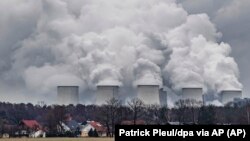A German government-appointed group has proposed that Germany stop burning coal to make electricity by the year 2038 at the latest. The proposal is part of the nation’s efforts to slow a general warming in Earth’s atmosphere, often called climate change.
The German group, called the Coal Commission, reached a deal early Saturday following months of debate. Other coal-dependent countries were closely watching the negotiations.
Germany gets more than a third of its electricity from burning coal, which creates large amounts of carbon dioxide and other gases linked to climate change.
The 28-member commission represents mining areas, power companies, scientists and environmental activists. The group suggested that its decision be reconsidered in 2032. That could bring forward the elimination of coal burning to as soon as 2035.
The plan calls for billions in federal spending to help affected areas deal with the economic effects, and to protect industry and the public from higher electricity prices. The move away from coal will also require major changes to Germany’s power system, the commission members said.
The decision still needs government approval.
Johan Rockstroem is the director of the Potsdam Institute for Climate Research. He told the Associated Press that the whole world is watching how Germany deals with the decision. The German economy is based on industry and engineering, and is the fourth largest economy in the world.
The plan calls for Germany’s coal-burning power stations to slowly suspend operations to reduce the production of greenhouse gases. Currently, Germany’s coal plants produce the largest amount of carbon dioxide of any country in Europe.
The commission’s plan leaves open which plants should be closed first. The plan says it is a decision the government needs to negotiate with the plants’ operators, the German news agency dpa reported.
The commission suggests that in the next 10 years, the government should help create up to 5,000 new jobs in the affected areas whenever coal mining is discontinued. These regions are in the states of North Rhine-Westphalia, Brandenburg, Saxony-Anhalt and Saxony. They should also get federal support totaling $45.6 billion over the next 20 years.
Germany has agreed on an “energy transition” that involves exchanging fossil fuels with renewable resources, such as wind power and energy from the sun.
Last year, renewables provided more energy to Germany than coal for the first time ever. But removing coal from power production entirely is proving much more difficult.
The reduction in coal will require an increase in renewable resources. And — at least for now — the country will have to burn more natural gas, which produces about half the amount of greenhouse gases as coal.
The environmental activist group Greenpeace wants all coal plants closed by 2030. It praised the commission’s decision, saying Germany finally has a plan for how it can become coal-free.” But the group also said the measures were not large and fast enough.
Other environmental groups welcomed the commission’s suggestion that the Hambach Forest in western Germany should be saved. The ancient woodland was at the center of anti-coal protests last year.
Energy company RWE’s plans to cut down half of the Hambach Forest to expand a mine led to demonstrations. For months, protesters prevented workers from entering the area.
I’m Pete Musto.
Kirsten Grieshaber reported this story for the Associated Press. Pete Musto adapted it for VOA Learning English. George Grow was the editor.
How energy dependent on coal is your country? How do you feel about your country’s dependence on coal? We want to hear from you. Write to us in the Comments Section or on our Facebook page.
_______________________________________________________________
Words in This Story
elimination – n. the act or process of removing something or someone
greenhouse gas(es) – n. a substance that adds to the general warming of the Earth’s atmosphere known as global warming
fossil fuel(s) – n. a fuel, such as coal, oil, or natural gas, that is formed in the earth from dead plants or animals
renewable – adj. able to be replaced by nature





